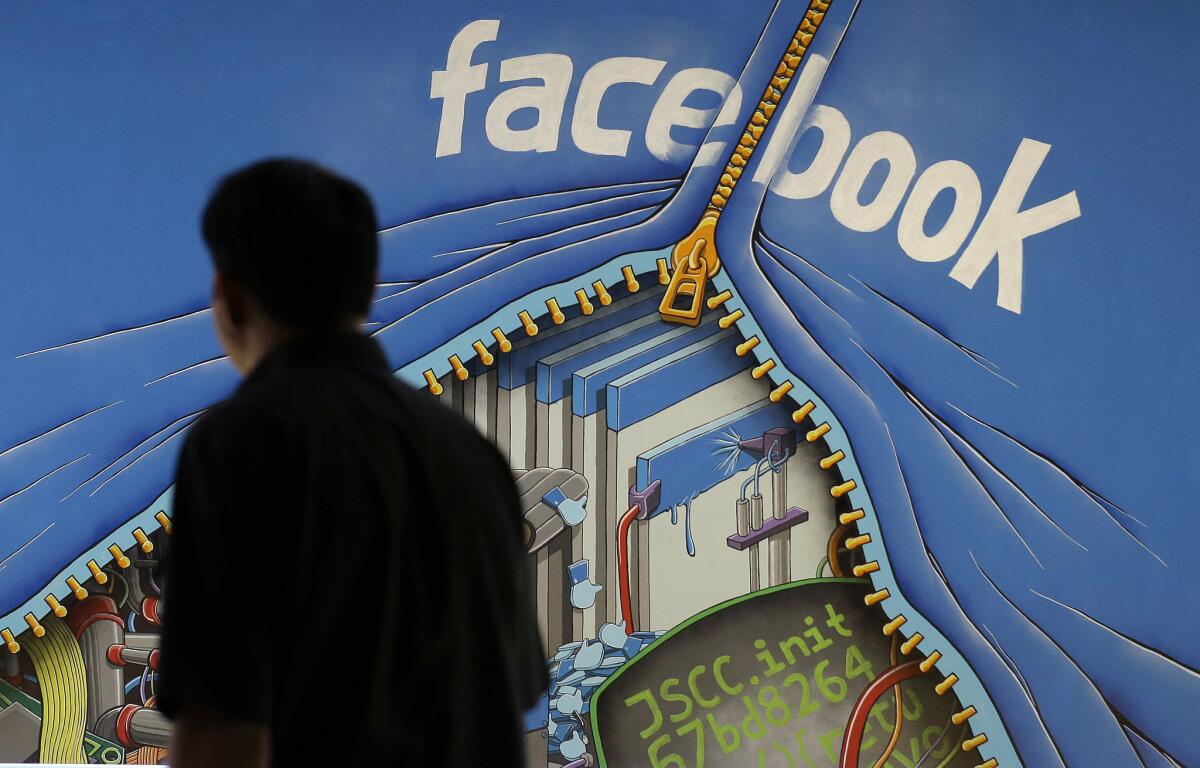Thanks to Facebook’s ‘trending topics’ problem, conservatives suddenly believe in unconscious bias. Is that a good thing?

- Share via
A funny thing happened when conservative media leaders met with Facebook CEO Mark Zuckerberg last week. The summit was meant to quell right-wing anger over news reports that the site’s “trending topics” links are chosen by curators with a liberal bias. It was Facebook’s effort at transparency. But it ended up revealing as much about conservative thought as it did about social media.
It turns out that conservatives take subtle ideological prejudices quite seriously. They confronted Zuckerberg “to raise the issue on unconscious bias where it can crop up,” Republican pollster and writer Kristen Soltis Anderson told CNN. She went on to explain that the meeting was an important step toward Facebook’s correcting for the left-leaning views of its employees.
Others on the right weren’t satisfied that Zuckerberg would move to address the underlying issue. “The real problem is that Facebook, Twitter and Google have systemically targeted conservatives, probably unknowingly, as a way to push liberal social policies,” according to the Conservative Review.
The notion that bias can be both systemic and unconscious — and, in fact, is probably unconscious precisely because it is so systemic — is normally an argument made by liberals. During presidential elections, left-wing pundits invoke unconscious bias to parse the reasons why voters do and do not respond to a particular candidate. If you believe in a slogan such as “Make America Great Again,” do you quietly long to return to an era when women and people of color had fewer chances at success? If you loathe the idea of Hillary Clinton becoming president — for reasons both related to her politics and her public persona — are you, deep down, kind of sexist?
But conservatives tend to dismiss the possibility that racism or sexism can manifest itself even among people who don’t think of themselves as racist or sexist. “Pockets of bias remain, but this country has reached the stage at which no success is beyond the reach of any American for reasons other than personal failings,” declared the Weekly Standard in 2012, as part of a debate over the role Barack Obama’s race played in his reelection. Unless there is a smoking gun such as a Ku Klux Klan membership card, many on the right think allegations of bias are nothing more than political correctness run amok — until, apparently, they see themselves as victims.
Unless there is a smoking gun such as a KKK membership card, many on the right think allegations of bias are nothing more than political correctness run amok.
In the wake of the Facebook summit, however, some conservatives are holding fast to the view that unconscious biases are not worth examining at all. “It seems a growing number of conservatives decided they must embrace the same tactics of the left and turn into professional grievance mongers and shake down artists,” wrote blogger Erick Erickson. Perhaps he’s worried that if his colleagues validate the existence of unconscious ideological bias, they should logically acknowledge other types of bias as well — such as prejudices based on race and gender.
Just as a dispassionate analysis of Facebook “trending topics” links might show an inadvertent bias toward liberal views, there is a wealth of academic research supporting the notion that unconscious racial and gender bias is real too. Hiring managers show a preference for resumes with male names at the top. Juries are more likely to see black people as instigators of violence and white people as acting in self-defense. The list goes on.
Because sites such as Facebook claim to be data-driven and ideologically neutral, it’s easy to forget that they, too, are run by humans with political beliefs. Although Facebook’s trending topics “are first surfaced by an algorithm,” as it explained in its defense, using the algorithm didn’t prevent the recent dust-up.
Similarly, a new investigative report from ProPublica alleges racial bias in a computer algorithm used by police departments to predict the likelihood of a person committing a crime in the future. Even though the risk score doesn’t directly ask about a suspect’s race, it’s biased against black people — and has resulted in black defendants being falsely flagged as future criminals.
Both conservatives and liberals should agree: Neutrality is a lie, and technology won’t save us.
Ann Friedman is a contributing writer to Opinion.
Facebook investigation reveals no evidence of bias against conservative topics, company says
There’s ‘no evidence’ Facebook suppressed conservative news, Mark Zuckerberg says
Follow the Opinion section on Twitter @latimesopinionand Facebook
More to Read
A cure for the common opinion
Get thought-provoking perspectives with our weekly newsletter.
You may occasionally receive promotional content from the Los Angeles Times.







